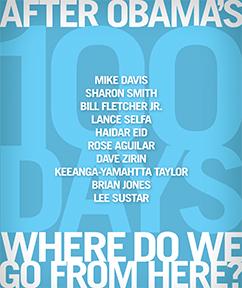New openings to push Obama
Millions of people looked forward to Barack Obama's presidency with a sense of pride and hope. But Obama's first 100 days have raised critical questions about the limits of what we can expect from a Democrat in the White House--and what it will take to get the change we want.
What do you think of Obama's 100 days? And what does the left need to do now to move the struggle forward? We asked a group of writers and activists for their answers to these questions. This commentary is from , the executive editor of BlackCommentator.com and author of the recent book Solidarity Divided: The Crisis in Organized Labor and a New Path Toward Social Justice.
THE FIRST 100 days have been a very mixed bag.
For example, I would never have expected the president of the United States to give support to the workers who occupied the Republic Windows factory. I would not have expected him--although I certainly hoped he would say something--to have talked about unions not being the problem, but part of the solution.
I think that the stimulus is going in the right direction, although I would quibble with some aspects of it. In the foreign policy realm, you have the commitment to withdraw troops from Iraq, and there's a lessening of the rhetoric around Iran.
On the other hand, we have a White House and a Cabinet that is loaded with Clinton carryovers. We have the presence of people like Larry Summers, who were at least partially responsible, in my opinion, for the whole mess that the financial system is in.
We have a double standard when it comes to the treatment of Wall Street versus the treatment of the auto industry. We have the announcement of the pullout from Iraq, while at the same time, there will be 50,000 troops remaining, along with mercenaries.
We have the appointment of George Mitchell to do work on the Israeli-Palestinian conflict, which I think was generally a good move. But at the same time, there's relative silence from the administration in the face of this new government in Israel, which is hard-line right wing and includes within it some crypto-fascists--certainly, it isn't committed to a Palestinian state.
Going back on the good news front, I think there's a greater commitment by the administration to deal with the question of climate change. But the policies are still within a moderate context--they don't radically address the roots of the crisis.
If you put all that together, what I'd say is we have an administration that is attempting to reform neoliberalism. Despite the discussions about the end of market fundamentalism, this is only an aspect of neoliberalism. I think that basically what the administration is attempting to do is reform and stabilize neoliberal globalization.
What that ends up meaning for the left is that there are some openings that did not exist under Bush--and that I don't think would have existed under a Hillary Clinton presidency--to really push this administration to do more.
At present, you would still define Obama as a centrist. I think you would define his Cabinet as pretty much center-right, with the exception of Hilda Solis perhaps. But it seems to me that there's some wiggle room, and this is where forces on the left and progressive forces need to be pushing.



